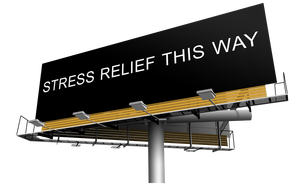 It is often that we hear people saying "I am so Stressed Out" or some other phrase of the same meaning, I have heard this said waiting in line at the grocery store, at work, in the gym, at the ATM and the list goes on and on. In the age of multitasking, most people at times feel as though they are overwhelmed by life, family, work or relationships. Here are 5 simple techniques that you can implement today in your life to reduce stress, the acronym is BREES 1. Breathe: Start by sitting in a relaxed position, either in a chair with your feet flat on the floor or lying down. Breathe in through your nose and out through your mouth. Take slow, deep breaths using your diaphragm. Take 30 breaths. At the end of this exercise you should feel less stressed and more relaxed. 2. Relaxation techniques: Progressive muscle relaxation involves tightening your muscles and releasing them. Start with your right foot, tighten the muscles in your toes and release them. Continue up your leg to your head, then go down your left side, from your shoulder all the way down to your left toes. Do not forget to tighten and release your midsection. This is for the whole body, not just the limbs. After trying this you should feel more relaxed. 3. Exercise: Research suggests that 30 minutes of Cardiovascular exercise 5 days a week will decrease stress and feelings of anxiety and depression. Exercise also aids with sleep, as long as you exercise up to three hours before you go to sleep. 4. Eating: Eating a healthy diet and keeping unhealthy foods to a minimum, will help with overall health and well being. I know it is difficult for some of us to eat healthy as we tend to crave "comfort foods" when we are feeling overwhelmed or stressed. This is when you should be making better food choices. Poor diet does not help reduce your stress level. You may feel satisfied for the time you are eating, but it takes its toll on your overall health, which can add to your stress level. 5. Sleep: Sleep is very important in reduction of stress. Sleep is very important for your body to function appropriately and to help you manage your stress better. The average adult needs 8 hours of sleep per night. Which means that some people need more to feel fully rested and other people need less. Know your body and how much sleep you need to feel fully rested. Not how much sleep you need to get through the day, there is a difference. If you are sleep deprived, you may rely on caffeinated products to help you perform or be more alert, and this may impact your sleep in a negative way as caffeine can cause sleep issues. For some people, caffeine can cause difficulty falling asleep, where you may feel alert and tired at the same time. If you are experiencing high levels of stress and difficulty with sleep, you may want to decrease your caffeine intake to alleviate stress symptoms as well as increasing sleep. It is important when feeling stress to get a full night's sleep. Disclaimer: Please check with your physician or health care provider before you begin an exercise program. This blog is for informational purposes only and is not meant to be a substitute for treatment or therapy.
1 Comment
 Have you ever had a terrible, horrible, no good very bad day? Like Alexander in the children's book? Many people experience illness, grief and loss, I am NOT minimizing these issues, these people had a very very bad day. This is for those of us, who have bad days, when it really was not the worst day. When we arrived at the gas station only to realize we left our wallet at home. Then we walked into the office and realized our keys were in another bag and had to wait an hour for security to come and let us in the office. This then made us late for our meeting, because the flash drive with the presentation was locked in the office. The presentation was not the best, because we did not review it and make final changes, because we were sitting in the hallway waiting for the key. It is not even noon yet... and at lunch you burn the roof of your mouth on pizza. It is definitely one of those days. You can see how a day starting off this way could leave you in a stressed and frustrated space. It is the little things that can make or break a day for most people. One extra small thing going wrong could be the difference between an ordinary day or a bad day. Why do we let this happen? Many times it is because we fall victim to the villain of Stress and his sidekick Frustration. It is usually when we start feeling frustrated that we realize, "I am stressed" and somewhere along the way, today took a turn to the dark side. It helps if we are aware of what is going on, when it is going on. Early intervention is important and can make the difference between a good day and a bad day. The earlier we realize that we are stressed we can make a conscious effort to change our outlook on the rest of the day and implement stress reduction strategies. Be an active participant in your day, try not to let your day happen to you. 5 steps to turning around your day (if you want too): 1. Embrace your bad day: It is okay to feel your emotions, all of them, both negative and positive. It is okay to be upset, stressed and down, even if you do not know why you are feeling that way. It is also okay to stay in a down or bad mood for the day as long as you are not taking things out on others, as this behavior will hurt your relationships. 2. Me Time: Go for a walk or take a time out. Go somewhere you can relax and think. Listening to music can be soothing and can lift your mood. Try some relaxation breathing, yoga or meditation if you enjoy these things. Do something you enjoy while you are reflecting on your day. 3. Exercise: This can help increase your mood and pull you out of the doldrums. Do something you enjoy such as going to the gym, running or biking. Sometimes it helps to exercise with a friend or workout buddy. 4. Phone a friend: Call a loved one or someone in your support system. Processing your day can do wonders in turning it around. Discussing your day with someone also helps with gaining perspective on the events of the day. 5. Let the Love In: Make a mental list of all of the wonderful things in your life, everything that makes you happy and smile. Thinking about all of the goodness in your life as well as everything you are grateful for, can help you feel better. Try to focus on the positive things in your life. Hugging loved ones, children and pets (trees are optional) can help. Many times it is the rushing around that has us forgetting important things and making errors that we usually would not make. We can still turn the day/evening around if that is what we choose to do. However, it is okay to be in a bad mood for a few hours or a day. Your self talk should say something like "tomorrow will be a better day." It also helps to realize that if burning the roof of your mouth was the worst part of your day, then you had a pretty good day! Disclaimer: This blog is for informational purposes only and is not a replacement for therapy or treatment. Please consult with your physician before starting an exercise program. |
AuthorDr. Deb is a successful Psychologist who practices in New York City. She is an Anxiety Specialist who works with adolescents and adults providing both individual and couples counseling. Categories
All
|
NAVIGATION
|
CONNECTSHARE THIS PAGE |
CONTACT MeDebra O'Shea, Psy.D PLLC
14 Penn Plaza New York, NY 10122 (347) 480-8095 |
LOCATIONWebsite by TherapyPrime
|
©2017 Dr. Debra O'Shea, Psy.D, PLLC

